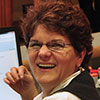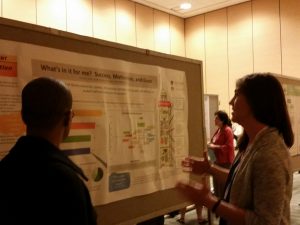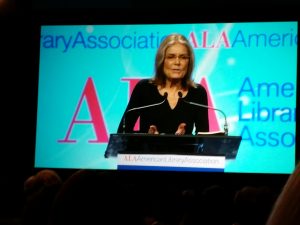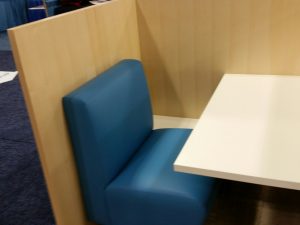This article is more than 5 years old.
This ALA Annual in San Francisco marked a high water mark in my ALA going experience. I was happy to present a poster session as the final assignment as chair of ZSR’s Assessment in Action team, and I did so along side of Meghan Webb, my fellow AiA team member. Assessment in Action is an ACRL grant funded program whose purpose is to build capacity in Academic Libraries to conduct high level assessment projects that will demonstrate the value of the library to the larger institution.
Our project focused on finding out how students define a successful year, and determining if the library was truly helping them to meet their goals. (Since our mission is to help students, faculty and staff succeed, this seemed a logical question to pursue.) The poster session was very busy. Many of the attendees, admittedly, were either past or future participants in the Assessment in Action project. (Assessment in Action is a three year project, and I applied for and was granted the opportunity to participate in the Year 2 cohort.) I heard positive feedback about our process, namely our decision to have students define success themselves, instead of using some academic definition like their position in class, or their GPA. We also heard positive comments of our use of graphics on our poster. Many of the year 3 Assessment in Action participants made note of the infographic we used to define our conclusions, and found it a powerful way to create meaning while minimizing text. Year 3 participants hoped to use such a method in their own poster a year from now. I appreciated having had the opportunity to chair such a vibrant and engaged team that included Meghan Webb, Le’Ron Byrd our former ZSR fellow, John Champlin of the Professional Development Center, Ryan Shirey of the Writing Center, and Glenda Boyles from the Bridge.
In attending sessions, my experience was better this year than previous years, either because I’m better and sussing out what will be the most helpful sessions to attend, or maybe sessions were just better overall. The sessions were quite varied, though, so “themes” are difficult to identify. I’ll give my biggest takeaways here.
Gems from Gloria Steinem’s opening keynote:
Gloria Steinem started her speech by reading a segment from her book My Life on the Road. She spent most of the time with the attendees answering questions that they posed. Among her best quotes:
–“The truth will set you free–but first it’s going to piss you off”
–“The single greatest stimulus to the economy our country could ever have is equal pay.”
–“The paradigm of ‘most violent societies’ is also the paradigm of strict heirarchy.”
–“The voting booth is the only place on earth where the richest people have no more power than the poorest people.”
–“Laughter is the only free emotion. So don’t go anywhere you can’t laugh. In fact, libraries should put up signs that say ‘No talking/but laughter is OK!'”
In responding to someone who said “I’m humbled to be in your presence,” she said “But I’m here to make you not humbled!”
She also recommended two books Sex and World Peace (which ZSR owns as an ebook) and The Mermaid and the Minataur (which ZSR owns in print.)
Assessment:
Whenever I am at ALA or ACRL I always seek out opportunities to sit in on any session that Lisa Hinchcliffe (form ACRL president, AiA team leader, Coordinator for Information Literacy Services and Instruction at the University of Illinois) is giving. This conference she presented as a part of a panel discussion entitled “All the Data: Privacy, Service Quality and Analytics.” Her co-presenter was Andrew Asher from Indiana University. They each had strong but different perspectives of the amount of data we keep about our users and what we should do about it. Lisa’s position was that we should be open and honest with users about what we keep and why, but not actively keep no data, since the recognizing patterns in the data allows us to improve services. Andrew was of the opinion that libraries should keep the absolute minimum data about users, even if it means we sacrifice the ability to improve services. Both interesting perspectives! The one point both agreed upon is that academic libraries, in order to ethically manage data and be responsible to our patrons, need to investigate and contractually agree upon exactly what data our vendors are keeping about our patrons every time they use information in one of their databases. “If you can’t control it, disclose it” became the mantra. Also, only track that information which you might care to analyze. If you won’t be analyzing data to improve services, don’t track it at all.
Merging public services desks:
Another very interesting session I went to was entitled “To Merge or not to Merge?” Three libraries gave their perspectives on the success/failure of a merging operations that had been in separate desks into a single service point. I’ve been to many of these sorts of sessions over the years hoping to gain some insight into what could be a very difficult transition in co-locating disparate services, even in such a friendly place as ZSR. This one was refreshing in its candor. Here are some of the takeaways from the different libraries’ presentations:
–Planning starts at least a year before the actual change with input from all sides about what exactly will take place at the desk, what will take place away from the desk, and how those operations will coordinate.
–When two groups of people are serving the same function at the same desk but are at two different pay grades, morale will decline.
–Communication is the key to making over the transition, and continues after the combining. It is an ongoing struggle to communicate enough.
–Deciding in advance that the new desk is not a merger of two different desks, but instead is a whole new service, might help ease the transition. Be clear and obvious about how and what you decide will happen at the desk.
–The most successful model (by that I mean, the desk with the happiest staff) moved reference librarians off of their desk, did training with the circulation staff to give them the ability to triage the easiest questions and provided methods to pass along the harder ones without judgement. Reference librarians used their former desk time to increase liaison contacts, do more teaching, embed in instruction, etc.
I don’t know what ultimately our flavor of “merger” will take, or how soon it may happen. There are as many options as there are libraries merging desks. Every time I attend a session on this topic I get more comfortable with the idea, and more aware of the responsibility to make sure we do it right because it is fraught with opportunities to do it wrong.
Finally, because it’s ALA at San Francisco, a few photos: Chinatown, Pride Parade, and a vendor visit with an awesome booth!







2 Comments on ‘MBL at ALA15 in SF’
I regret I wasn’t able to attend Gloria Steinem’s speech, Thanks for sharing some of the highlights. I know your AiA experience was one that was meaningful. You did a great job of planning, implementing and analyzing it all. Will you post your poster anywhere in ZSR so we can see it?
Awesome report and pictures! I’d like to see the poster up close too.
Thanks,
James